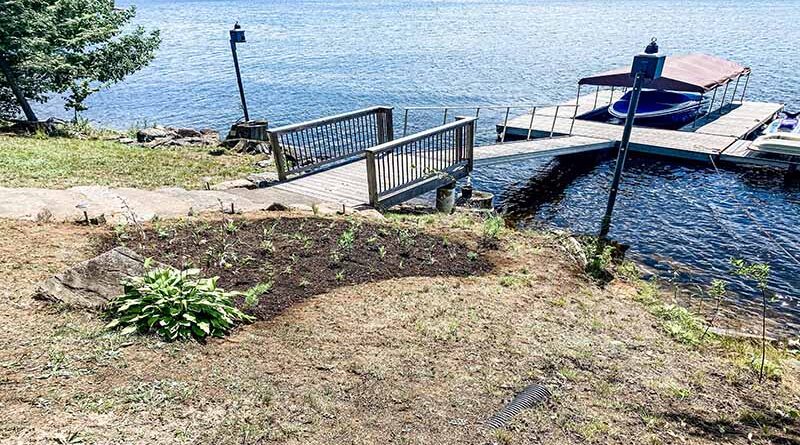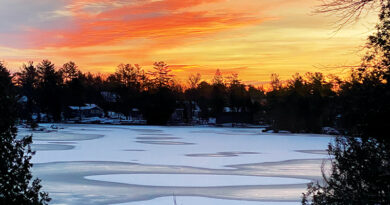Abbey Gardens Community Trust
For most people, when they think about their cottages or homes in Ontario’s “cottage country”, the first thing they think about is the lake. Campfires by the lakes, drinks on the dock, boating, fishing – so many things we love about this area revolve around being on or near the water. This is especially true in the Haliburton Highlands, home to over 500 lakes spread across a beautiful and rugged piece of the Canadian Shield, featuring sandy shores and breathtaking cliffs, and everything in between. 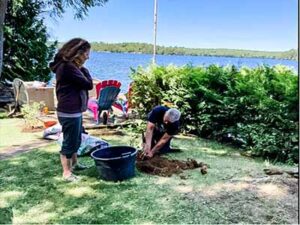
These lakes are not only a source of recreation and tourism, but also play a vital role in the region’s ecosystem. Development along these shorelines has increased over the years as more people invest in lakeside homes, and urban landscaping methods can have serious ecological impacts to the health of our lakes. To protect and preserve these valuable natural resources, shoreline naturalization is becoming an increasingly important initiative in Haliburton County, and the ecological team at Abbey Gardens Community Trust is doing their part to educate and engage the community to participate in a better way to beautify their shores.
Abbey Gardens is a charitable organization with a mission to re-green a former gravel pit into a community destination that provides recreational, educational, ecological, and economic development opportunities to live more sustainably. There are public trails, a disc golf course, a Food Hub and café specializing in local food, a market garden, a craft brewery, a wood fired pizza truck, an event space, and so much more. A big part of their mission is rooted – literally! – in restoring, rehabilitating, and reforesting areas that have suffered major ecological damage. The restoration team, led by Ecologist Cara Steele, works closely with organizations like Trent University and U-Links to study various soil remediation, cover cropping, and planting methods to examine what methods yield effective results for the unique ecosystems of Haliburton County.
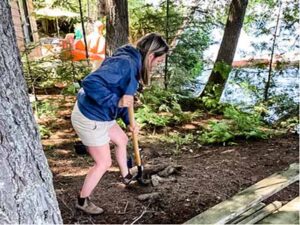 In 2022, Steele partnered with Kennisis Lake Cottage Owners Association (KLCOA) in a pilot project to restore eleven shoreline properties across three lake systems, planting over 1250 native plants and shrubs. The goal of the pilot was to educate lakeside property owners about how natural shorelines can still be beautiful, while protecting overall lake health.
In 2022, Steele partnered with Kennisis Lake Cottage Owners Association (KLCOA) in a pilot project to restore eleven shoreline properties across three lake systems, planting over 1250 native plants and shrubs. The goal of the pilot was to educate lakeside property owners about how natural shorelines can still be beautiful, while protecting overall lake health.
75% of our shorelines should be in a natural state for a minimum of 30 m (100 feet) back from high water, otherwise water quality will degrade over time. Shoreline naturalization is the process of restoring a lake’s natural shoreline, typically by planting native species of vegetation along the water’s edge. Natural shorelines are vital to maintaining the overall health of a lake. Shoreline plants protect from erosion, wave action and ice damage, moderate water temperature, flooding, and absorb nutrients from human activity.
Did you know that shorelines are called the Ribbon of Life?
Eighty to ninety percent of species depend on shoreline habitat for nesting, shelter, travel, reproduction and feeding.
There are several benefits to shoreline naturalization. Firstly, natural shoreline planting helps to prevent erosion and sediment buildup, which can harm water quality and wildlife habitat. Additionally, native vegetation provides food and shelter for wildlife, improving the overall biodiversity of the lake. 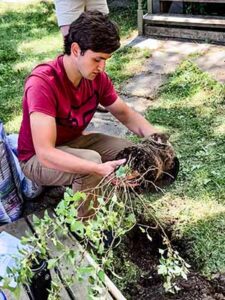
Another key benefit of shoreline naturalization is that it helps to reduce the impact of human activities on the lake. Natural shorelines act as a buffer between the lake and the surrounding land, absorbing runoff and filtering pollutants before they reach the water. This helps to maintain water quality and protects the lake from potential harm caused by human activities such as agriculture, forestry, and development.
As shorelines along lakes and rivers are being developed, these areas are at greater risk to erosion and reduced water quality. Naturalizing shorelines by planting native flowers, trees and shrubs help to keep our lakes swimmable, drinkable and fishable. A major takeaway from the pilot program was that homeowners felt overwhelmed and unqualified to do their own native planting. Like any planting project, there are a lot of factors to take into account when thinking about naturalizing your shoreline, such as hours of sunlight, soil conditions, your personal property use, preferences, the amount of time you’re willing to invest in maintenance, and more.
In response, Steele and her team are expanding the shoreline restoration outreach program to support more homeowners throughout Haliburton, Muskoka, and the Kawartha Lakes.
Through site visits, planting plans, and hands-on planting, the team will address individual property needs and restoration goals from start to finish.
If you’re looking for a DIY option with a little help from the experts, Steele has curated shoreline plant kits that are uniquely tailored to the site conditions prevalent in our area. The Pollinator Garden Kit is for sites with dry to normal soil that experience part shade to full sun. This kit includes a mix of wildflowers, grasses, shrubs and trees that will attract pollinators throughout the whole season. The Open Shoreline Kit benefits sites with low lying areas that have moist soil and at least six hours of sunlight per day. The wildflowers can be planted right at the waters’ edge to create a beautiful display of colour. And finally, the Forest Garden Kit is appropriate for shaded shorelines that have dry to normal soil. Alternatively, the plants can be used to naturalize and add plant diversity to shady upland areas.
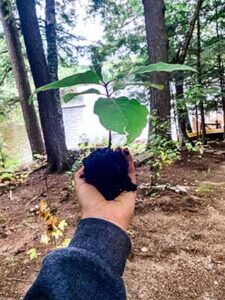 This year, Abbey Gardens has partnered with Friends of Ecological and Environmental Learning (FEEL) to host their Native Plant Sale, featuring beautiful hand picked native plants, trees, and shrubs, as well as Steele’s curated Planting Kits. All proceeds from the sale go directly to support the Children’s Water Festival and restoration projects at Abbey Gardens.
This year, Abbey Gardens has partnered with Friends of Ecological and Environmental Learning (FEEL) to host their Native Plant Sale, featuring beautiful hand picked native plants, trees, and shrubs, as well as Steele’s curated Planting Kits. All proceeds from the sale go directly to support the Children’s Water Festival and restoration projects at Abbey Gardens.
To learn more about the shoreline planting outreach program, FEEL plant sale, shoreline kits, or more, visit abbeygardens.ca or email Cara Steele at cara@abbeygardens.ca!

